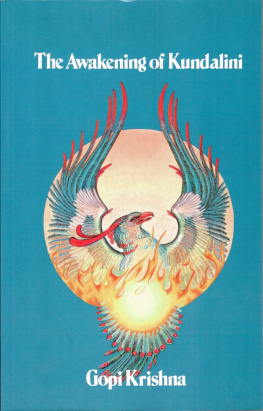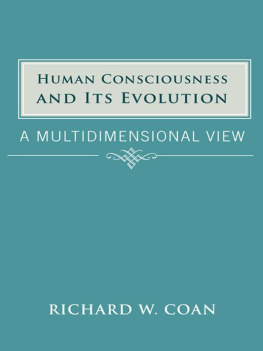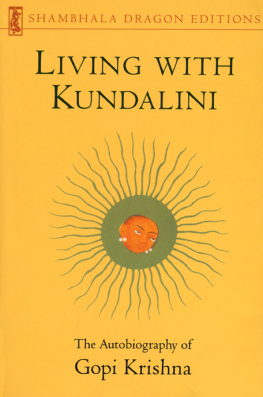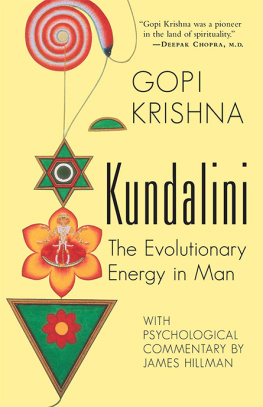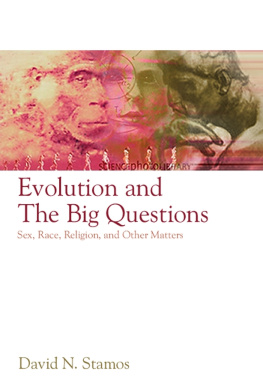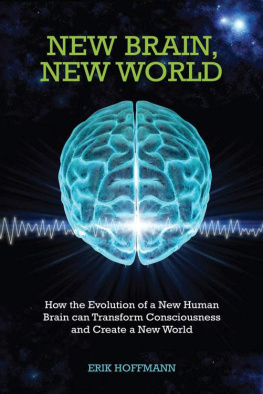Kundalini: The Dawn of a NewScience
by
Gopi Krishna
Published by:
The Institute for Consciousness Research
and
The Kundalini Research Foundation, Ltd.
Smashwords Edition
Kundalini: The Dawn of a New Science
Copyright 1979, Gopi Krishna
This ebook is licensed for your personal enjoymentonly. This ebook may not be re-sold or given away to other people.If you would like to share this book with another person, pleasepurchase an additional copy for each recipient. If youre readingthis book and did not purchase it, or it was not purchased for youruse only, then please return to Smashwords.com or your favoriteretailer and purchase your own copy. Thank you for respecting thehard work of this author.
First Published in 1978 as The Dawn of A NewScience by:
The Kundalini Research & Publication Trust, NewDelhi
Reprinted 1979
Reprinted 1999 by:
The Institute for Consciousness Researchand
The Kundalini Research Foundation, Ltd.
Published by:
The Institute for Consciousness Research
165 Valley Crescent,
RR #4, Markdale ON,
Canada N0C 1H0
The Kundalini Research Foundation, Ltd.
86 Wallacks Drive
Stamford CT
06902 U.S.A.
International Standards BookNumber: 978-0-9921082-5-0
Cover Photo: Courtesy of Daniel Kolos
Table of Contents
Drawings & Illustrations
1
Mysticism andEvolution
The world has grown so accustomed to treatingmysticism as a body of nebulous doctrines and mystics as aclass of introvert human beings, more interested in a hazy innerthan a real outer world, that it has become almost impossible toconvince one about the colossal importance of this subject. It isan irony of fate that modern science, while utilizing to thefullest every bit of knowledge and experience gathered throughoutthe past, should have repudiated that which has been the crowningachievement of the ancient cultures during the thousands of yearsof their existence. The dimension of this error, in all its nakedhorror, has already begun to dawn in the more sensitive minds ofthe race. The complete neglect of this side of human nature hascreated a situation of extreme uncertainty in the present world.Thus, while the pyramids still stand intact to draw our attention,after thousands of years, it has become doubtful whether our owncreations and achievements will survive the end of the currentcentury.
In the context of the present politicalsetup the forcible imposition of a Universal State presupposes aglobal war in which one power emerges triumphant to impose auniversal rule. The world-condition as it exists today does notencourage the hope that nations would of their own accord agree toenter into a partnership on the basis of equality and fraternity ina global confederation or commonwealth. But what would be thecondition of mankind after the third world war, if it is fought,neither Toynbee nor anyone else can predict. The other way toimpose a Universal rule of one country can become possible only ifthe scientists of that state discover a new method to paralyze orpetrify the whole population of its rivals or the entire world bymeans of some hitherto unknown radiation or electronic bombardmentere a war is fought.
In making this observation Toynbee sounds anote of prophecy. But whether he knows that this avenue does notlie anywhere in the labyrinth of modern thought is a separatematter. Before we try to find out the device by which moderncivilization can be saved from a devastating fratricidal war, it ismore important to determine the factors responsible forcivilization itself. In answering this question Toynbee cites thefollowing lines of Henry Bergson:
We do not believe in the unconscious (factor) inhistory... the great subterranean currents of thought, of whichthere has been so much talk, only flow in consequence of the factthat masses of men have been carried away by one or more of theirown number... it is useless to maintain that (social Progress)takes place of itself, bit by bit, by virtue of the spiritualcondition of the society at a certain period of its history. It isreally a leap forward which is only taken when the society has madeup its mind to try an experiment: this means that the society musthave allowed itself to be convinced, or at any rate allowed itselfto be shaken, and the shake is always given by somebody.
In giving to man a moral confirmation which herequired to be a social animal, Bergson continues, Nature hasprobably done all that she was able to do for the human species.But just as men of genius have been found to push back the boundsof the human intelligence... so there have arisen privilegedsouls who have felt themselves related to all souls, and who,instead of remaining within the limits of this group, and keepingto the (restricted) solidarity which has been established bynature, have addressed themselves to humanity in general in an elanof love. The apparition of each of these souls has been like thecreation of a new species composed of one unique individual.
It is obvious that Bergson refers to the twocategories that have been responsible for all the progress achievedby mankind from the dawn of reason to the present day, viz,the people of talent and the mystic. It is through the inwarddevelopment of personality in gifted individuals that they wereable to perform these creative acts in the outward field of actionthat cause the growth of human societies. We know they are notfashioned but come ready made from Nature, by experience andeducation adapting themselves to the part they have to play tocause the transformation for which they are equipped.
For Bergson, says Toynbee, it is the mystics whoare the superhuman creators, par-excellence, and he finds theessence of the creative act in the supreme moment of the mysticalexperience... the creative personality is impelled totransfigure his fellow men into fellow creators by recreating themin his own image.
If we accept Bergsons version of the causesresponsible for civilization and progress, the issue now ariseswhat factors are responsible for the creation of genius andmystical ecstasy. As long as we are not able to determine thesefactors, it would not be prudent to pin our hopes on this avenue ofsafety from destructive wars, for the simple reason that, asmatters stand at present, there is no guarantee at all that we canhave the right type of mystic at the right moment to save us from athreatening self-caused disaster. They cannot be coined at will norcan there be any surety about their performance in a crisis. Theymight be more prone to ecstatic contemplation and more intent ontheir own salvation than on the welfare of mankind as a whole. Ifwedded to a particular religious doctrine, as many of them havebeen in the past, they could even be instrumental in igniting thevery fires which we expect them to quell.
The conditions existing till the firstquarter of this century did not demand a reversal of Natures orderto fashion and depute saviors at her own choice, for no immediatethreat to the safety of the race was involved. But now, when in thetwinkling of an eye computer-based devices can spring to action anymoment to initiate a holocaust, the chances are extremely remotethat the catastrophe can be arrested in the nick of time by anysingle individual however high his spiritual stature might be,unless gifted with unbelievable miraculous powers that can do theimpossible.
In making this general assessment theexamples in front of Bergson probably were the great founders ofreligions and other great spiritual luminariesBuddha, Christ,Mohammed, Guru Nanak, Socrates, Shankara, St. Paul and others. Butmystical experience is not confined to these giants of historyalone. There have been hundreds, even thousands, of lesser lightsin different parts of the old world, and at different times fromthe dawn of history, who also claimed to have the same elevatingexperiences, often with minor variations in detail. But many ofthem were so deeply engrossed in their own affairs and in their ownpeculiar state of mind that they had no time whatsoever to sparefor anything else. They may have been able to create a small circleof influence, their coteries of followers and admirers, or caused alocal stir in the church or the contiguous religious community towhich they belonged, but the ripples they set in motion did notproceed beyond a limited periphery to cause reactions sufficient tochange the course of history.


